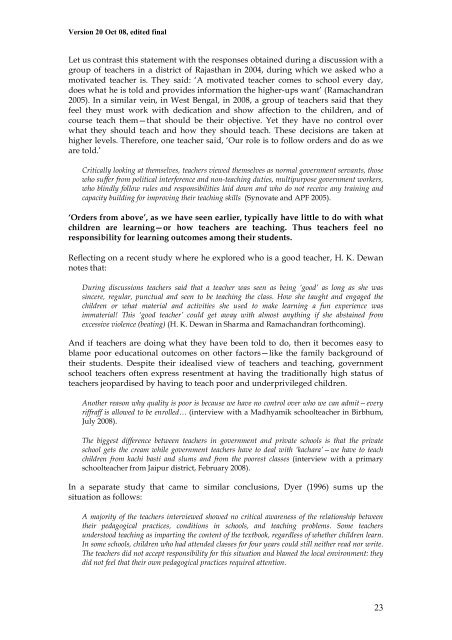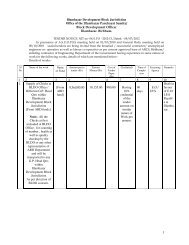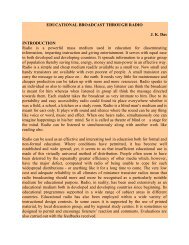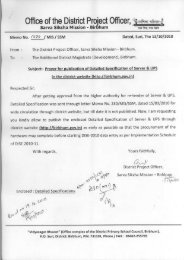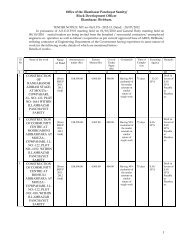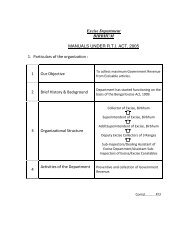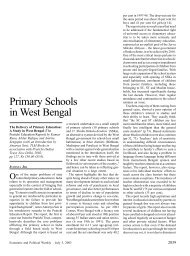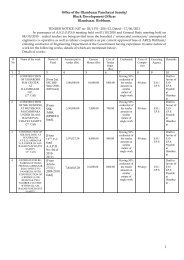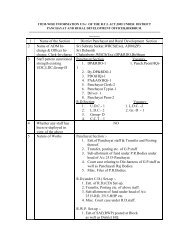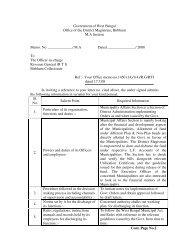Version 20 Oct 08, edited finalFour, building a nurturing system for assessment <strong>and</strong> developing monitoring systems thatcreate a continuous link between <strong>the</strong> <strong>school</strong> <strong>and</strong> academic <strong>and</strong> administrative supportstructures. The classic <strong>and</strong> well-documented example <strong>of</strong> a nurturing monitoringsystem was demonstrated in <strong>the</strong> Shiksha Karmi Project (SKP) in Rajasthan. The keyto SKP’s effectiveness lay in providing academic resource support to <strong>teachers</strong> <strong>and</strong>teacher educators in a manner that fostered creativity <strong>and</strong> respected teacherexperience, skills <strong>and</strong> knowledge. Central to <strong>the</strong> success <strong>of</strong> <strong>the</strong> Shiksha Karmi Project<strong>and</strong> process was <strong>the</strong> training–review-monitoring system, which was also adopted inLok Jumbish as <strong>the</strong> Review-Planning-Monitoring (RPM) cycle. Training programmeswere contextual <strong>and</strong> need-based. The 40-day induction training was residential <strong>and</strong>participatory in nature. The conventional didactic training method, still used in <strong>the</strong>formal <strong>school</strong> system, was rejected in favour <strong>of</strong> discussions, self-learning <strong>and</strong> colearningthrough exercises <strong>and</strong> a range <strong>of</strong> activities including songs, role-play <strong>and</strong>practice teaching. The induction training was followed by two 30-day trainingprogrammes in <strong>the</strong> first two years, 20-day training after two years <strong>and</strong> a 10-daytraining programme every year. In addition, <strong>the</strong> Shiksha Karmis (SKs) alsoparticipated in a two-day monthly review, planning <strong>and</strong> difficulty removal meeting.SKP was probably <strong>the</strong> first significant attempt to involve research centres, not asexternal evaluators but as co-participants, in an ongoing <strong>and</strong> concurrent process forcourse correction <strong>and</strong> problem solving. The Institute <strong>of</strong> Development Studies <strong>and</strong>S<strong>and</strong>han (both Jaipur based) were involved in concurrent monitoring <strong>and</strong> support.Over <strong>the</strong> years a number <strong>of</strong> o<strong>the</strong>r organisations like Digantar, Urmul Trust, SewaM<strong>and</strong>ir, Vidhya Bhavan, Bodh Shiksha Samiti <strong>and</strong> Sankalp were invited toparticipate, support monitoring <strong>and</strong> provide academic support <strong>and</strong> evaluation. Whatis noteworthy is that <strong>the</strong> monitoring function was not seen as an isolated activity; itwas closely linked to participation in <strong>the</strong> selection <strong>of</strong> Shiksha Karmis, training,documentation <strong>and</strong> field support. This enabled <strong>the</strong> monitoring <strong>and</strong> support agencyto tailor <strong>the</strong> training programme to <strong>the</strong> needs <strong>of</strong> <strong>the</strong> Shiksha Karmis <strong>and</strong> also followthrough evaluation findings with concrete inputs in training <strong>and</strong> o<strong>the</strong>r field supportinputs.How ground realities affect <strong>teachers</strong>’ perception <strong>of</strong> <strong>the</strong>ir role <strong>and</strong> objectivesDiscussions with <strong>teachers</strong> around <strong>the</strong> country reveal that many experience nostalgiafor <strong>the</strong> ‘good old days’ when <strong>the</strong>y enjoyed high social status <strong>and</strong> were respected <strong>and</strong>looked up to by <strong>the</strong> community. Today, <strong>teachers</strong> are acutely aware <strong>of</strong> <strong>the</strong> negativeperceptions about <strong>the</strong>m as government functionaries who draw good salaries <strong>and</strong>,most importantly, as work shirkers who take no responsibility for <strong>the</strong> learning <strong>of</strong>children (Synovate <strong>and</strong> Azim Premji Foundation 2005). Their reflections on thissituation generate a series <strong>of</strong> disturbing conclusions.Teachers generally hold an idealised vision <strong>of</strong> <strong>the</strong> importance <strong>of</strong> <strong>the</strong> teacher’s rolein shaping future generations. At <strong>the</strong> same time, <strong>teachers</strong> today rarely view <strong>the</strong>irobjective as helping children learn. Ra<strong>the</strong>r, <strong>the</strong>ir objective is to follow orders.The teacher is like a sculptor who moulds <strong>the</strong> future <strong>of</strong> students, backbone <strong>of</strong> society; <strong>the</strong>y transmitcultures <strong>and</strong> traditions to students, inculcate moral values, provide guidance, etc. <strong>and</strong> have asignificant role in preparing students as complete human beings in society (Synovate <strong>and</strong> APF2005).22
Version 20 Oct 08, edited finalLet us contrast this statement with <strong>the</strong> responses obtained during a discussion with agroup <strong>of</strong> <strong>teachers</strong> in a district <strong>of</strong> Rajasthan in 2004, during which we asked who amotivated teacher is. They said: ‘A motivated teacher comes to <strong>school</strong> every day,does what he is told <strong>and</strong> provides information <strong>the</strong> higher-ups want’ (Ramach<strong>and</strong>ran2005). In a similar vein, in West Bengal, in 2008, a group <strong>of</strong> <strong>teachers</strong> said that <strong>the</strong>yfeel <strong>the</strong>y must work with dedication <strong>and</strong> show affection to <strong>the</strong> children, <strong>and</strong> <strong>of</strong>course teach <strong>the</strong>m—that should be <strong>the</strong>ir objective. Yet <strong>the</strong>y have no control overwhat <strong>the</strong>y should teach <strong>and</strong> how <strong>the</strong>y should teach. These decisions are taken athigher levels. Therefore, one teacher said, ‘Our role is to follow orders <strong>and</strong> do as weare told.’Critically looking at <strong>the</strong>mselves, <strong>teachers</strong> viewed <strong>the</strong>mselves as normal government servants, thosewho suffer from political interference <strong>and</strong> non-teaching duties, multipurpose government workers,who blindly follow rules <strong>and</strong> responsibilities laid down <strong>and</strong> who do not receive any training <strong>and</strong>capacity building for improving <strong>the</strong>ir teaching skills (Synovate <strong>and</strong> APF 2005).‘Orders from above’, as we have seen earlier, typically have little to do with whatchildren are learning—or how <strong>teachers</strong> are teaching. Thus <strong>teachers</strong> feel noresponsibility for learning outcomes among <strong>the</strong>ir students.Reflecting on a recent study where he explored who is a good teacher, H. K. Dewannotes that:During discussions <strong>teachers</strong> said that a teacher was seen as being ‘good’ as long as she wassincere, regular, punctual <strong>and</strong> seen to be teaching <strong>the</strong> class. How she taught <strong>and</strong> engaged <strong>the</strong>children or what material <strong>and</strong> activities she used to make learning a fun experience wasimmaterial! This ‘good teacher’ could get away with almost anything if she abstained fromexcessive violence (beating) (H. K. Dewan in Sharma <strong>and</strong> Ramach<strong>and</strong>ran forthcoming).And if <strong>teachers</strong> are doing what <strong>the</strong>y have been told to do, <strong>the</strong>n it becomes easy toblame poor educational outcomes on o<strong>the</strong>r factors—like <strong>the</strong> family background <strong>of</strong><strong>the</strong>ir students. Despite <strong>the</strong>ir idealised view <strong>of</strong> <strong>teachers</strong> <strong>and</strong> teaching, government<strong>school</strong> <strong>teachers</strong> <strong>of</strong>ten express resentment at having <strong>the</strong> traditionally high status <strong>of</strong><strong>teachers</strong> jeopardised by having to teach poor <strong>and</strong> underprivileged children.Ano<strong>the</strong>r reason why quality is poor is because we have no control over who we can admit—everyriffraff is allowed to be enrolled… (interview with a Madhyamik <strong>school</strong>teacher in Birbhum,July 2008).The biggest difference between <strong>teachers</strong> in government <strong>and</strong> private <strong>school</strong>s is that <strong>the</strong> private<strong>school</strong> gets <strong>the</strong> cream while government <strong>teachers</strong> have to deal with ‘kachara’—we have to teachchildren from kachi basti <strong>and</strong> slums <strong>and</strong> from <strong>the</strong> poorest classes (interview with a <strong>primary</strong><strong>school</strong>teacher from Jaipur district, February 2008).In a separate study that came to similar conclusions, Dyer (1996) sums up <strong>the</strong>situation as follows:A majority <strong>of</strong> <strong>the</strong> <strong>teachers</strong> interviewed showed no critical awareness <strong>of</strong> <strong>the</strong> relationship between<strong>the</strong>ir pedagogical practices, conditions in <strong>school</strong>s, <strong>and</strong> teaching problems. Some <strong>teachers</strong>understood teaching as imparting <strong>the</strong> content <strong>of</strong> <strong>the</strong> textbook, regardless <strong>of</strong> whe<strong>the</strong>r children learn.In some <strong>school</strong>s, children who had attended classes for four years could still nei<strong>the</strong>r read nor write.The <strong>teachers</strong> did not accept responsibility for this situation <strong>and</strong> blamed <strong>the</strong> local environment: <strong>the</strong>ydid not feel that <strong>the</strong>ir own pedagogical practices required attention.23
- Page 5 and 6: Version 20 Oct 08, edited finalIWhy
- Page 7 and 8: Version 20 Oct 08, edited finalThis
- Page 9 and 10: Version 20 Oct 08, edited finalIISh
- Page 11 and 12: Version 20 Oct 08, edited finalwant
- Page 13 and 14: Version 20 Oct 08, edited finalWhy
- Page 15 and 16: Version 20 Oct 08, edited finalallo
- Page 17 and 18: Version 20 Oct 08, edited finalfor
- Page 19 and 20: Version 20 Oct 08, edited finalHeal
- Page 21: Version 20 Oct 08, edited finalcomm
- Page 25 and 26: Version 20 Oct 08, edited final(two
- Page 27 and 28: Version 20 Oct 08, edited finalThe
- Page 29 and 30: Version 20 Oct 08, edited finalIIIW
- Page 31 and 32: Version 20 Oct 08, edited finalstat
- Page 33 and 34: Version 20 Oct 08, edited finalunde
- Page 35 and 36: Version 20 Oct 08, edited final- Th
- Page 37 and 38: Version 20 Oct 08, edited finalIVBe
- Page 39 and 40: Version 20 Oct 08, edited finalOver
- Page 41 and 42: Version 20 Oct 08, edited finallate
- Page 43 and 44: Version 20 Oct 08, edited finalNotw
- Page 45 and 46: Version 20 Oct 08, edited finalwas
- Page 47 and 48: Version 20 Oct 08, edited finalacco
- Page 49 and 50: Version 20 Oct 08, edited finalscho
- Page 51 and 52: Version 20 Oct 08, edited finalVTra
- Page 53 and 54: Version 20 Oct 08, edited finalques
- Page 55 and 56: Version 20 Oct 08, edited final1994
- Page 57 and 58: Version 20 Oct 08, edited finalimpr
- Page 59 and 60: Version 20 Oct 08, edited finalBox
- Page 61 and 62: Version 20 Oct 08, edited finaladmi
- Page 63 and 64: Version 20 Oct 08, edited finalTrai
- Page 65 and 66: Version 20 Oct 08, edited finalhelp
- Page 67 and 68: Version 20 Oct 08, edited final(Kin
- Page 69 and 70: Version 20 Oct 08, edited finalinst
- Page 71 and 72: Version 20 Oct 08, edited finalfund
- Page 73 and 74:
Version 20 Oct 08, edited finalCrea
- Page 75 and 76:
Version 20 Oct 08, edited finalBIBL
- Page 77 and 78:
Version 20 Oct 08, edited finalDe,
- Page 79 and 80:
Version 20 Oct 08, edited finalGove
- Page 81 and 82:
Version 20 Oct 08, edited finalKuma
- Page 83 and 84:
Version 20 Oct 08, edited final____
- Page 85 and 86:
Version 20 Oct 08, edited finalSyno
- Page 87 and 88:
Version 20 Oct 08, edited finalSC:


